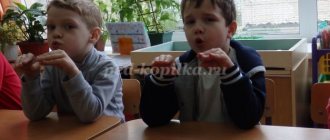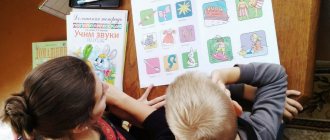System of work on speech development of preschool children
System of work on speech development of preschool children
System of work on speech development of preschool children
The objectives of the work of preschool educational institutions on the speech development of preschool children are
:
— mastery of speech as a means of communication and culture;
— enrichment of the active vocabulary, development of coherent
, grammatically correct dialogical and monologue speech;
— development of speech creativity
;
—development
sound and intonation culture of speech, phonemic hearing;
— acquaintance with book culture, children’s literature, listening comprehension of texts of various genres of children’s literature;
— formation of sound analytical-synthetic activity as a prerequisite for learning to read and write.
In the process of organizing work on children’s speech development
We use the following approaches:
1. An integrated approach to the development of oral speech
, providing:
– understanding speech, attracting children’s
to one’s own speech and the speech of others;
– development
coherent dialogic and monologue speech;
– enrichment and clarification of the dictionary;
– development
grammatical structure of speech;
– development of the speech apparatus
, sound pronunciation;
– development of fine motor skills
2. Practical mastery of speech norms and their application in various forms and types of children's activities.
3. Development of children's oral speech
in conjunction with other mental processes.
Job
in this area is built on the principles
of systematicity
, consistency and continuity.
Creating conditions for the full development of children's speech
, we provide:
— creation of a developing
subject-spatial environment;
— purposeful work of educators on children’s speech development
in all types of children's activities and in close cooperation with parents;
— increasing the professional growth of teachers in matters of speech development of preschoolers
;
— study of the state of speech development of children during preschool childhood
;
An important place in work on the speech development of preschool children
is occupied by the effective organization
of a developing
subject-spatial environment in accordance with the Federal State Educational Standard for Education.
Speech corners
in all age
groups of preschool educational institutions .
Certain requirements for their content
have been developed Teachers have accumulated and systematized
a variety of practical material for organizing
speech games and classes
: manuals for articulation exercises, sets of finger games, thematic albums, games for enriching vocabulary, developing grammatical structure, coherence
speech, development
phonemic hearing and fine motor skills, plot-based role-playing games.
The developmental environment of each age
group is complemented by different types of theaters, which are of no small importance in
the speech development of children
.
Speech development in preschoolers
In order to successfully exist in society, a person needs the most important skill - the ability to communicate with other people. When communicating, a person conveys some of the information to the interlocutor using gestures and facial expressions. But the lion's share of it falls on that unique skill that is available on earth only to man. This skill is speech. Normal development of children certainly includes the acquisition of coherent speech. It is not an innate skill for people, and the child will have to master it on his own. Formed and continuously changing over many generations, speech is one of the most important components of human life. A small child faces a big, important task - to master the art of expressing his thoughts correctly and clearly, to assimilate all the richness and diversity of the Russian language. And the child, as a rule, successfully copes with its implementation.
The basics of using speech and its development occur in early childhood. That is, in the period from one year to 5-6 years, the basis is laid on which the child will subsequently build his entire life in society. Speech development is a unique phenomenon, directly related to both the intellectual development of the child and his communication skills. And, of course, during this period, a little person needs the help and support of loved ones more than ever; he needs someone who can guide his development and help him master rich and varied language material, teach him how to properly handle an amazing and complex instrument of communication - speech.
The development of coherent speech in a small person is a long and complex process. The relevance of this task for a preschool child is difficult to overestimate. With the help of speech, the child learns about the world around him, develops communication skills and associative thinking. From a scientific point of view, this process and its patterns are even studied by a separate linguistic discipline - ontolinguistics.
The child draws his first experience of reproducing human speech from his immediate environment, listening and remembering the speech of adults that he hears around him. Peculiarities of child psychology suggest imitative behavior as one of the main ones for a young child. Psychologists and sociologists have found that children who spend the first few years of life in social isolation subsequently cannot fully adapt to either language or life in society. This fact has been proven in the example of so-called wild children - children who, for some reason, were deprived of contact with people under the age of 6 years. Stories about such children repeating the fate of the hero of Kipling's fairy tale, Mowgli, periodically find documentary evidence. Only, unlike Mowgli, a child who finds himself isolated from human society at an early age cannot adapt to normal life. Such children have difficulty mastering the basics of human speech and suffer from serious developmental delays.
From this we can conclude that the early period of speech development is one of the most important in the overall development of a child, and parents should pay the closest attention to this process. Speech acquisition is a key indicator for preschool children of their overall mental development.
A child’s speech acquisition in preschool age can be divided into three stages, each of which has its own characteristics. They are closely related to both age and the general psychoneurological development of the baby.
Period up to a year
At this age, the baby is just beginning to distinguish for himself the speech of the adults around him. From the first month of life, the baby carefully peers and listens to everything that happens around him. He very quickly learns to distinguish between voices and intonations. Therefore, try to speak kindly to your baby more often, and comment out loud on your and his actions. Poems and songs are perfect for children at an early age.
If you, being next to your child, constantly contact him, talk, play, show objects and toys, then soon, already at 3-4 months, your baby will begin to engage in conversation with you, greeting you with a joyful roar.
By six months, the child gradually begins to babble, trying to pronounce syllables. At 7 months he already knows his name and turns his head when you call him by name. You can start playing “Ladushki”, “Magpie-Crow” or “The Horned Goat is Coming” with him. These nursery rhyme games will help your child better perceive rhythmically organized poetic speech, and they will simply bring a lot of joy. Try it - you'll see, the child will be delighted!
At 9-10 months, the baby can already laugh and tries to pronounce the first words, for example, “dad” or “mom”. Sing along to the music you hear. Understands the words “no”, “no”, can respond to greetings (waving a hand when saying “hello” or “bye-bye”). Your child’s vocabulary gradually begins to form, and is constantly replenished from the outside with new concepts and expressions. Poems, nursery rhymes, bedtime stories and just constant conversations with your baby will serve as an excellent incentive for him to start speaking on his own.
Initial speech acquisition
This stage of speech development occurs between the ages of approximately one and three years and has its own characteristics.
It must be borne in mind that before the child begins to master active speech and speak himself, he learns to understand the speech of others. Until about one and a half years old, only a few basic definition words can be observed in a child’s vocabulary: mom, dad, aunt, uncle, give. His family members still serve as role models for him, so don’t forget to continue telling your child what you are doing and why. He really already understands everything.
At this age, young children are prone to generalizations. Thus, "Yum!" can mean not only the feeding process, but also a child’s plate, spoon, and even a feeling of hunger. Also, in many words they discard the endings, ignore some letters (pronouncing “Aya” instead of “Anya”, etc.), and sometimes even shorten the word to one stressed syllable. There is no need to worry about these “irregularities” - they are completely normal. Over time, the child will learn to pronounce words and sounds correctly, and the family’s task is to unobtrusively explain to him how to do it correctly.
Try to articulate more clearly when talking to your baby. Give him the opportunity to watch your facial expressions when you say a new word. Show and name objects that come into your baby’s field of vision, especially while walking: a car, a dog or a crow flying past will not only entertain the child on the street, but will also help in the difficult task of developing speech.
In the second year of life, children distinguish intonation perfectly. Therefore, when reading fairy tales to your child, pay attention to the fact that a wolf or a bear, for example, speaks in a deep voice, and a little mouse squeaks in a thin voice.
After two and a half years, the child can already use simple sentences consisting of two or three words in coherent speech. In his mind, patterns begin to form in the agreement of words with each other, the difference between singular and plural. Language material acquires the features of a certain system in the child’s perception. And he begins to actively use this system, entering the next stage of speech acquisition.
Word creation
Speech development in preschool children goes through another interesting stage. At the age of about three years or a little older, the child moves from the accumulation of language material to its active development. To do this, he tries to use the patterns of language that he has managed to trace for himself at the moment. The famous children's writer Korney Ivanovich Chukovsky has a completely adult book, “From Two to Five.” Being a linguist, Korney Ivanovich in this work tried to determine what motivates small native speakers, every minute creating new words of their special children's dialect. And what did it turn out to be? It turns out that children do not create these neologisms by chance, but by sorting parts of words by meaning, and compose them following the grammatical structure of the Russian language. Thus, crackers turn into “bites” due to the semantic correspondence with the verb “bite”, a fan turns into “twirler”, a shaggy dog with long hair is succinctly characterized as “shaggy”, and the bed rest prescribed by the doctor immediately becomes “bed rest”.
Every day, every hour, a child is bombarded with many unfamiliar words, forms, and meanings. Nevertheless, he easily navigates this diversity, classifying, distributing, altering, adapting to himself the entire vocabulary available to him. A child’s speech develops easily, with a minimum of stress on the part of a small native speaker, whose intuition in relation to his native language is simply amazing!
End of preschool: preparation for reading and writing
At this stage, the child continues to acquire grammatical norms. But now he strives not so much to create as to correspond to the coherent speech of adults, to make it as correct as possible. In the monologues of a five- to six-year-old child, complex and complex constructions and linking words begin to appear. The grammatical structure of speech is leveled.
At the same age, the child begins to master written speech. And if in the first years of life, letters and numbers were an impossible abstraction for a child, but now, thanks to the experience gained, he can already trace the relationship between the real world and written language. Since reading and writing are psychophysiological processes, their relationship with the general development of speech in preschool children is very high.
As a rule, children learn to read before they write. Speech development includes the perception of the sound composition of a word on paper; understanding the relationship between sounds and letters occurs more easily if the child has sufficiently developed attention, memory, and has the skill of systems thinking. Therefore, preparation for reading and writing includes not only the development of speech in preschool children, but also systematic thinking and imagination.




